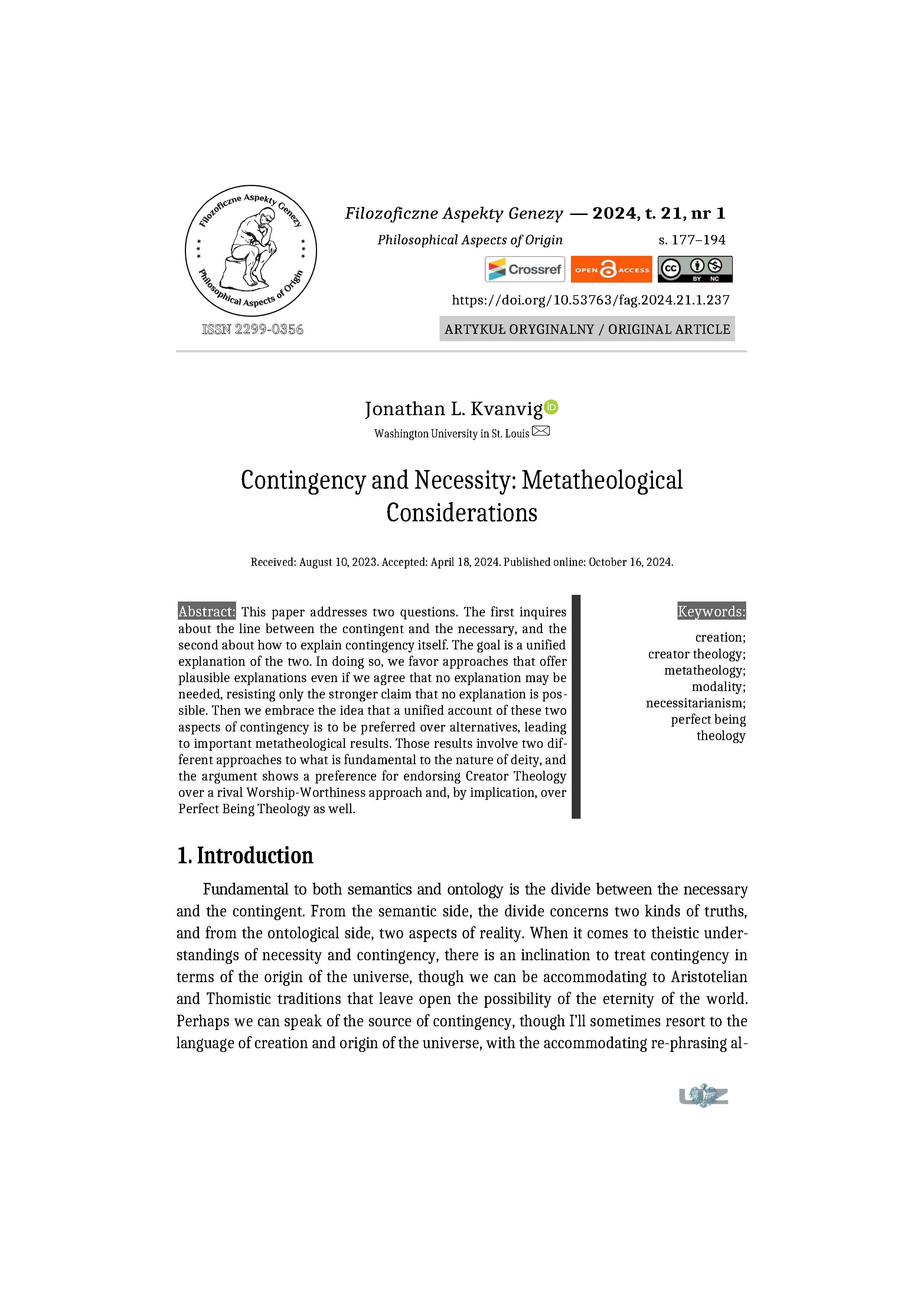
Opublikowane 17.10.2024 — zaktualizowane 28.03.2025
Wersje
- 28.03.2025 - (2)
- 17.10.2024 - (1)
Słowa kluczowe
- creation,
- creator theology,
- metatheology,
- modality,
- necessitarianism
- perfect being theology ...More
Prawa autorskie (c) 2024 Filozoficzne Aspekty Genezy

Utwór dostępny jest na licencji Creative Commons Uznanie autorstwa – Użycie niekomercyjne 4.0 Międzynarodowe.
Jak cytować
Abstrakt
This paper addresses two questions. The first inquires about the line between the contingent and the necessary, and the second about how to explain contingency itself. The goal is a unified explanation of the two. In doing so, we favor approaches that offer plausible explanations even if we agree that no explanation may be needed, resisting only the stronger claim that no explanation is possible. Then we embrace the idea that a unified account of these two aspects of contingency is to be preferred over alternatives, leading to important metatheological results. Those results involve two different approaches to what is fundamental to the nature of deity, and the argument shows a preference for endorsing Creator Theology over a rival Worship-Worthiness approach and, by implication, over Perfect Being Theology as well.
Downloads
Bibliografia
- Almeida Michael J., The Metaphysics of Perfect Beings, Routledge, Boston 2008.
- Augustine, Eighty-Three Different Questions, Catholic University of America Press, trans. David L. Moshe, Washington 1982.
- DeRose Keith, Epistemic Possibilities, Philosophical Review 1991, Vol. 100, No. 4, pp. 581–605. DOI: https://doi.org/10.2307/2185175
- Egan Andy and Weatherson B., Epistemic Modality, Oxford University Press, Oxford 2009.
- Fetzer James H., On »Epistemic Possibility«, Philosophia 1974, Vol. 4, No. 2–3, pp. 327–335. DOI: https://doi.org/10.1007/BF02379231
- Hintikka Jaakko, Knowledge and Belief, Cornell University Press, Ithaca 1962.
- Hoffman Joshua and Rosenkrantz Gary, Hard and Soft Facts, Philosophical Review 1984, Vol. 93, No. 3, pp. 419–434. DOI: https://doi.org/10.2307/2184544
- Huemer Michael, Epistemic Possibility, Synthese 2007, Vol. 156, No. 1, pp. 119 –142. Knobe Joshua and Seth Yalcin, Epistemic Modals and Context: Experimental Data, Semantics and Pragmatics 2014, Vol. 7, No. 10, pp. 1–21. DOI: https://doi.org/10.1007/s11229-005-4782-8
- Kvanvig Jonathan L., Depicting Deity: A Metatheological Approach, Oxford University Press, Oxford 2021. DOI: https://doi.org/10.1093/oso/9780192896452.001.0001
- Lewis David, Truthmaking and Difference-Making, Noûs 2001, Vol. 35, No. 4, pp. 602–615. DOI: https://doi.org/10.1111/0029-4624.00354
- Marcus Ruth Barcan, Modalities and Intensional Languages, Synthese 1961, Vol. 13, No. 4, pp. 303–322. DOI: https://doi.org/10.1007/BF00486629
- Menzel Christopher, The Possibilism-Actualism Debate, in: Edward N. Zalta (ed.), The Stanford Encyclopedia of Philosophy, Metaphysics Research Lab, Stanford University, https://tiny.pl/nn4fr9s2.
- Menzel Christopher, In Defense of the Possibilism — Actualism Distinction, Philosophical Studies 2020, Vol. 177, No. 7, pp. 1971–1997, http://dx.doi.org/10.1007/ s11098-019-01294-0. DOI: https://doi.org/10.1007/s11098-019-01294-0
- Morris Thomas, Perfect Being Theology, Noûs 1987, Vol. 21, No. 1, p. 24 [19–30].
- Murphy Mark C., God’s Own Ethics: Norms of Divine Agency and the Argument From Evil, Oxford University Press, Oxford 2017. DOI: https://doi.org/10.1093/oso/9780198796916.001.0001
- Nagasawa Yujin, Maximal God: A New Defense of Perfect Being Theism, Oxford University Press, Oxford 2017. DOI: https://doi.org/10.1093/oso/9780198758686.003.0005
- Plantinga Alvin, The Nature of Necessity, Cornell University Press, Ithaca 1978. DOI: https://doi.org/10.1093/0198244142.001.0001
- Ramsey Frank P., Critical Notice of L. Wittgenstein’s Tractatus logico-philosophicus, Mind 1923, Vol. 32, No. 128, pp. 465–478. DOI: https://doi.org/10.1093/mind/XXXII.128.465
- Reed Baron, Fallibilism, Epistemic Possibility, and Epistemic Agency, Philosophical Issues 2013, Vol. 23, No. 1, pp. 40–69. DOI: https://doi.org/10.1111/phis.12003
- Russell Bertrand, Possibility and Necessity, in: Alasdair Urquhart and Albert C. Lewis (eds.), The Collected Papers of Bertrand Russell, Volume 4: Foundations of Logic, 1903–1905, Routledge, Boston 1994, pp. 507–521.
- Schaffer Jonathan, Laws for Metaphysical Explanation, Philosophical Issues 2017, Vol. 27, No. 1, pp. 302–321. DOI: https://doi.org/10.1111/phis.12111
- Sorensen Roy, Meta-Agnosticism: Higher Order Epistemic Possibility, Mind 2009, Vol. 118, No. 471, pp. 777–784. DOI: https://doi.org/10.1093/mind/fzp105
- Taylor Richard, Fatalism, Philosophical Review 1962, Vol. 71, No. 1, pp. 56–66, http://dx.doi.org/10.2307/2183681. DOI: https://doi.org/10.2307/2183681
- Teller Paul, Epistemic Possibility, Philosophia 1972, Vol. 2, No. 4, pp. 303–320. DOI: https://doi.org/10.1007/BF02381591
- Teller Paul, Professor Fetzer on Epistemic Possibility, Philosophia 1974, Vol. 4, No. 2–3, pp. 337–338. DOI: https://doi.org/10.1007/BF02379232
- Williamson Timothy, Knowledge and Its Limits, Oxford University Press, Oxford 2000.
- Williamson Timothy, Modal Logic as Metaphysics, Oxford University Press, Oxford 2013. DOI: https://doi.org/10.1093/acprof:oso/9780199552078.001.0001
- Wilson Jessica M., Nonlinearity and Metaphysical Emergence, in: Stephen Mumford and Matthew Tugby (eds.), Metaphysics and Science, Oxford University Press, Oxford 2013, pp. 201–231.
- Wilson Jessica M., No Work for a Theory of Grounding, Inquiry: An Interdisciplinary Journal of Philosophy 2014, Vol. 57, No. 5–6, pp. 535–579. DOI: https://doi.org/10.1080/0020174X.2014.907542
- Yalcin Seth, Epistemic Modals, Mind 2007, Vol. 116, No. 464, pp. 983–1026. DOI: https://doi.org/10.1093/mind/fzm983
- Yalcin Seth, More on Epistemic Modals, Mind 2009, Vol. 118, No. 471, pp. 785–793. DOI: https://doi.org/10.1093/mind/fzp106


